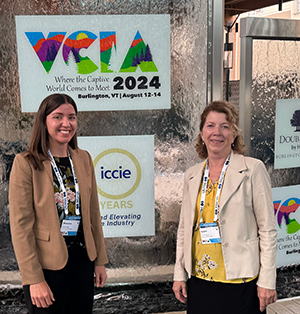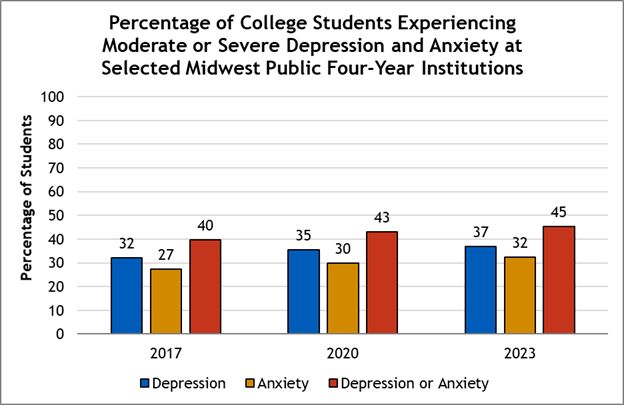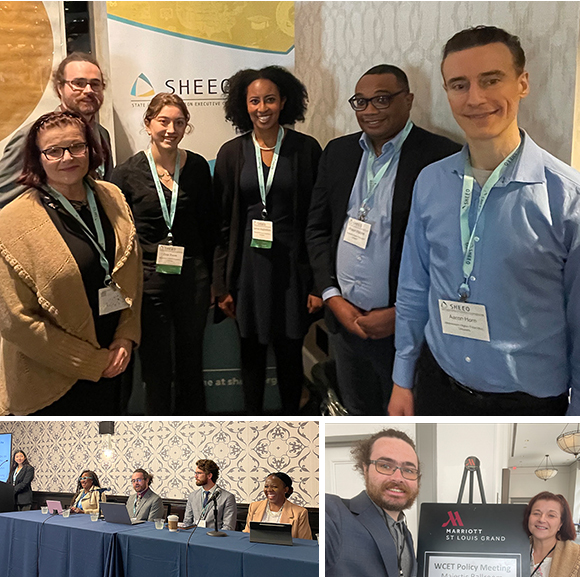MHEC News August 2024
The latest policy and research, convenings, programs, contracts, articles of interest, and updates for members of the Midwestern Higher Education Compact.
Greetings,
I hope that you had a restful and fun summer. For our staff, this has been a terrific time for us to connect in person with many of our peers at meetings and conferences throughout the region and country, so that we can better serve our MHEC states. Fall is just around the corner with campuses beginning to welcome students back. We too, are eager to connect with our commissioners, committee members, and many other stakeholders who are engaged with our work. Our staff are especially looking forward to continuing our conversations from our Midwest FAFSA state planning meetings beginning at the end of the month.
 I just returned from Burlington, Vermont, where Vice President Breanne Hegg and I attended the Vermont Captive Insurance Association annual conference. Surprisingly, Vermont is the number one place in the world where captives are domiciled! While there, we learned a great deal about the opportunities that captives provide and how similar organizations are using captives to benefit their members.
I just returned from Burlington, Vermont, where Vice President Breanne Hegg and I attended the Vermont Captive Insurance Association annual conference. Surprisingly, Vermont is the number one place in the world where captives are domiciled! While there, we learned a great deal about the opportunities that captives provide and how similar organizations are using captives to benefit their members.
Additional highlights from this month's newsletter include:
- Policy & Research: Depression and Anxiety Indicator, FAFSA State Planning, GCQ Website Site User Update
- Convenings: Concurrent Enrollment Webinar Series, Connect at EDUCAUSE
- Contracts: ERP Update, New Parchment Products and Services
- Commissioner News: Missouri commissioner
- Team Updates: SHEEO and WCET conferences
We look forward to connecting with you this fall.
We always welcome your feedback and suggestions about how we can best meet the needs of our region.
Susan G. Heegaard
MHEC President
Policy & Research
Depression and Anxiety Rates Continue to Rise Among College Students
The latest update to MHEC's Interactive Dashboard introduces a new series of indicators gauging the mental health of college students at selected institutions in the Midwest. Consistent with national trends, the prevalence of depression and anxiety – two of the most common mental health conditions – has continued to rise at Midwest institutions in the wake of the COVID-19 pandemic. The percentage of students experiencing moderate to severe depression or anxiety at public four-year institutions increased from 40% in 2017 to 45% in 2023.
Untreated mental health problems, such as depression and anxiety, are often associated with poor academic outcomes, including lower GPA and higher dropout rates.1 In addition, students with moderate or severe depressive or anxiety symptoms have a higher prevalence of harming oneself (without the intent to die), thinking about suicide, and attempting suicide compared to students with no or minimal symptoms of depression or anxiety.2
This indicator tracks the percentage of students experiencing moderate to severe depression or anxiety based on data from the Healthy Minds Study (HMS) survey. The HMS survey utilizes validated screening tools and severity thresholds to assess whether students have experienced depression (PHQ-9) or anxiety (GAD-7) during the past two weeks. Estimates derived from the HMS survey reflect mental health conditions at specific participating institutions rather than institutions across the entire Midwest. In 2023, 9,817 students responded to the survey, representing nine public four-year institutions across six Midwest states: Illinois, Kansas, Michigan, Missouri, Ohio, and Wisconsin.
This indicator was developed as part of a collaboration between MHEC and the Healthy Minds Network. MHEC staff receive some of the best ideas for updates and new topics for the dashboard's indicators from its readers!

Source. Healthy Minds Network. (2017, 2020, 2023). Healthy Minds Study - Student Survey.
1 Kessler, R. C., Foster, C. L., Saunders, W. B., & Stang, P. E. (1995). Social consequences of psychiatric disorders, I: Educational attainment. The American journal of psychiatry, 152(7), 1026–1032. https://doi.org/10.1176/ajp.152.7.1026
2 Casey, S. M., Varela, A., Marriott, J. P., Coleman, C. M., & Harlow, B. L. (2022). The influence of diagnosed mental health conditions and symptoms of depression and/or anxiety on suicide ideation, plan, and attempt among college students: Findings from the Healthy Minds Study, 2018-2019. Journal of affective disorders, 298(Pt A), 464–471. https://doi.org/10.1016/j.jad.2021.11.006
MHEC Begins Next Phase in FAFSA State Planning and Support
Building statewide formal and informal infrastructure to support FAFSA completions is critical for ensuring access to higher education and fostering student success once enrolled. During the state work sessions at the 2024 Midwest FAFSA Summit, participants met with others from their state who work with and/or are invested in increasing rates of FAFSA completions. During those work sessions, the state teams mapped out the array of organizations and resources devoted to supporting FAFSA completions in their state and discussed the challenges and opportunities for improving collaborations, connectedness, and communications. MHEC is facilitating ongoing statewide conversations, dividing meetings into sets of states: Illinois, Iowa, Kansas, and Missouri will meet on August 27 at 3:00 p.m. CT; Nebraska, South Dakota, North Dakota, Minnesota, and Wisconsin will meet on August 28 at 3:00 p.m. CT; and Indiana, Michigan, and Ohio will meet on August 29 at 2:00 p.m. CT. If you cannot attend the first round of calls but still wish to be included in FAFSA communications, please confirm your interest. Reach out to Samra Asghedom, strategic and executive initiatives manager, to register or to address further questions about the summit.
FAFSA Batch Corrections: MHEC is Interested in State and Institutional Challenges
It has come to the attention of MHEC staff that higher education institutions may be facing challenges with the timely completion of their FAFSA batch corrections. The U.S. Department of Education had previously shared that batch institutional corrections via the Electronic Data Exchange would be available by mid-August. However, on August 1 the Department provided an update indicating that batch correction functionality will be deferred until the 2025-26 FAFSA cycle. This means higher education institutions must run the batch corrections themselves. MHEC is exploring possible options for supporting institutions in its member states which might need help with this unexpected burden. In an effort to better understand the scope of the problem, MHEC would like to hear from states and institutions expecting to have difficulty completing FAFSA batch corrections in a timely manner. If this is an issue for you and you and your organization or if you have ideas for possible solutions to the problem, please contact Jonathan McNicholes, MHEC’s stakeholder engagement and convening assistant manager, at (612) 677-2775.
As MHEC explores how best to support institutions struggling with FAFSA corrections, we wish to provide the following updates and resources:
- An update from the U.S. Department of Education on Batch Corrections, including additional supports and flexibilities
- An update from the U.S. Department of Education on Processing Corrections to Paper FAFSA forms
- NASFAA (National Association of Student Financial Aid Administrators) Podcast discussing and explaining the issues and concerns about batch corrections
- An article from The University Herald explaining the potential negative impact of not being able to process batch corrections to FAFSA this year
- A link to request third party support for batch corrections through ECMC (Educational Credit Management Corporation)
Graduate Credit Quest Website Receives Interactive Update for Site Users
MHEC has launched a refreshed Graduate Credit Quest website offering better support for teachers and their pathway toward concurrent/dual enrollment instructor qualification. Some of the new features include the ability to:
- Share course selections with peers, supervisors, and advisors using an improved sharing system;
- Build and manage multiple lists and timelines for enhanced planning flexibility; and
- Resume credentialing processes seamlessly without repeating any steps to ensure a smooth and efficient experience.
MHEC welcomes user input on the new site. Additionally, MHEC is ready to assist with any onboarding to the site. Contact Jerry Murphy who can line-up a training session schedule or arrange one-on-one training.
Convenings
Resources Available from Past Convenings
Concurrent Enrollment Webinar Series: How States and Systems Can Support Practitioner Efforts to Strengthen Dual Enrollment
Explore how states in the MHEC region are implementing the recommendations from the January 2024 Community College Research Center (CCRC) and College in High School Alliance report, “How States and Systems Can Support Practitioner Efforts to Strengthen Dual Enrollment." This five-part webinar series showcased practical examples of states operationalizing the report's three key recommendations: 1) expanding access to dual/concurrent enrollment, 2) strengthening dual/concurrent enrollment pathways, and 3) building and sustaining access, quality, and success through robust partnerships. Review these recordings and learn how states and systems in the MHEC region are translating these recommendations into effective practices to enhance dual enrollment. Any questions may be addressed to Dr. Jenny Parks, vice president.
- How States and Systems Can Support Practitioner Efforts to Strengthen Dual Enrollment: Insights from Wisconsin and Minnesota
- Expanding Access to Dual and Concurrent Enrollment: Ohio's Innovative Model
- Indiana's Blueprint for Strengthening Dual and Concurrent Enrollment Pathways
- Everyone is Responsible for Program Quality, so Who’s Accountable? A Look at State Approaches to Quality Assurance Nationally and in the MHEC Region.
- Supporting Dual and Concurrent Enrollment on College Completion and Equity: Perspectives from Minnesota and Complete College America
At EDUCAUSE: Technologies Community Breakfast, October 22
Breanne Hegg, vice president, Deb Kidwell, director of technology initiatives, and Nathan Sorensen, director of government contracts, will be attending EDUCAUSE and look forward to hosting a breakfast for representatives of the Technologies Community and invited guests on October 22, prior to the start of the EDUCAUSE annual conference. This event will offer an excellent opportunity to connect, share insights, and discuss the impactful work within the community. It promises to be an engaging and informative gathering, celebrating the progress and collaboration within the community. For more information about the breakfast, contact Ms. Kidwell.
Value of IT Webinar Series Coming Soon
Members of MHEC's Technologies Community will facilitate an upcoming webinar series on the value of information technology, starting September 24. More information is coming soon. Questions can be directed to Deb Kidwell, director of technology initiatives.
Contracts
Next Generation ERP RFP Update: Share Your Insights in MHEC's Technology Survey
The Next Generation Higher Education ERP (Enterprise Resource Planning) System of Systems (MHEC-RFP-04182024) is on track with 15 higher education subject matter experts who are evaluating 12 proposals from system integrators, consulting firms, ERP vendors, and resellers. This solicitation invited proposals from a diverse array of suppliers within the ERP ecosystem — including ERP software vendors, system integrators, consultants in higher education technologies, and resellers — to enhance, upgrade, or implement financial management, human resources, student information systems, and related services, emphasizing vendors with a proven track record of supporting diverse educational institutions and expertise in ERP system management. Recommendations for awards are expected this fall. If you have any questions, contact Nathan Sorensen, director of government contracts.
Please take a moment to help MHEC staff prepare for the EDUCAUSE 2024 conference by completing, a brief, 10-minute survey on ERP systems, automation, and technology priorities from institutions across the Midwestern region. Institutional feedback will guide MHEC's request for proposal (RFP) evaluators in making informed recommendations for the proposed RFP solutions of MHEC's ERP System of Systems RFP.
Additional Products and Services Included in MHEC's Parchment Agreement
Last month MHEC noted a contract extension of the contract with Parchment LLC/Instructure Inc. (MHEC-01312021). Parchment is a leader in education credentials technology, enabling learners, educators, and employers to collect, analyze, use, and share credentials in simple and secure ways. Additional products and services have been added to the master services agreement. In addition to Parchment’s products that enable the sending and receiving of digital credentials, states and institutions now have the ability to contract for course sharing, dual enrollment, transfer articulation management, and data automation. MHEC has identified a comprehensive list of the digital credentialing and pathways solutions through Parchment/Instructure on the website. If you have any questions, contact Nathan Sorensen, director of government contracts.
Commissioner Appointments
Missouri
Brad Christ
State Representative; Member, Budget Committee
Missouri General Assembly
Term: 7/23/2024 to 7/1/2026
Team Updates
MHEC Shares Insights on Regional Tuition Programs at SHEEO Higher Education Policy Conference
Jonathan McNicholes, stakeholder engagement and convening assistant manager, presented on behalf of MHEC during the SHEEO Higher Education Policy Conference panel presentation Reflections on Accessibility: Lessons from Regional Tuition Reciprocity Programs organized by the Southern Regional Education Board.
Staff Monitor Evolving Regulations, Institutional Closures
Sara Appel, director of M-SARA, Jonathan McNicholes, stakeholder engagement and convening assistant manager, attended the Distance Ed at a Crossroads: The Changing Landscape of New Regulations conference hosted by WCET and SAN in Saint Louis, Missouri. During the event, there were many in-depth discussions on the numerous changes occurring at the federal level, including recent and upcoming regulations and negotiated rulemaking. Topics covered included the changes to third-party servicers, impacts from the Chevron ruling, and proposed regulations on state authorization reciprocity and distance education such as the 500 rule. MHEC's participation in this event ensures that staff remain informed about these evolving regulations, enabling them to assist MHEC member states and institutions with any questions they may have regarding these impactful changes. Dr. Jenny Parks, vice president, and Ms. Appel are also serving on the SARA Institutional Closures Working Group which includes three subgroups that will focus on three aspects of institutional closures: teach-out plans/teach-out agreements, academic records (records retention), and financial arrangements.

Top Photo (L to R): At the SHEEO Higher Education Policy Conference are: Sara Appel, director of M-SARA; Jonathan McNicholes, stakeholder engagement and convening assistant manager; Zola Davis, compact intern; Samra Asghedom, strategic and executive initiatives manager; Dr. Shaun Wyche, associate director of research and data analysis; and Dr. Aaron Horn, associate vice president of research. Bottom Photo Left (L to R): Melissa Juarez, research analyst, Southern Regional Education Board; Dr. Elisa Jaden, program specialist and regional SARA director, SREB; Jonathan McNicholes, stakeholder engagement and convening assistant manager, MHEC; Jonathan Gowin, director of Tuition Break, New England Board of Higher Education; and Dr. Ray Burgman Gallegos, vice president programs and services, Western Interstate Commission for Higher Education. Bottom Photo Right (L to R): Jonathan McNicholes, stakeholder engagement and convening assistant manager, MHEC; and Sara Appel, director of M-SARA, MHEC, at the WCET conference.
Articles and Resources of Interest
How “course marking” can bring OER to the mainstream
UB Daily | August 14, 2024
Education Department: 2025-26 FAFSA to fully debut by Dec. 1
Higher Ed Dive | August 7, 2024
The untapped potential of near-completers: Why higher ed must double down on adult learners
University Business | August 1, 2024
Revised Criteria for Accreditation and Assumed Practices
Higher Learning Commission | June 2024
Open educational resources: How access continues to expand
University Business | July 29, 2024
Recruitment Challenges Easing for State and Local Governments
MissionSquare Research Institute | July 23, 2024